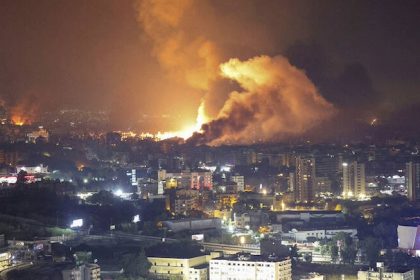
Massive consecutive airstrikes hit Beirut’s southern suburbs from late Saturday into Sunday, shaking the city and lighting up the sky with red and white flashes for nearly 30 minutes, eyewitnesses reported.
The strikes followed days of Israeli bombardment targeting Hezbollah strongholds in the area, which have been escalating after the killing of the group’s leader, Sayyed Hassan Nasrallah.
Nasrallah was confirmed dead by Hezbollah following an Israeli airstrike on September 27, which targeted the group’s central command in Beirut. Israeli authorities had announced his death, and Hezbollah has not disputed the claim. Lebanese security sources reported that Hashem Safieddine, Nasrallah’s potential successor, has been missing since Friday following another Israeli airstrike near Beirut’s international airport.
The recent strikes on Dahiyeh, a densely populated area and Hezbollah stronghold in southern Beirut, have severely hampered rescue efforts following Thursday’s attacks.
As Israeli military operations expand across Lebanon, including a strike on the northern city of Tripoli on Saturday, tensions in the region continue to rise. Israel’s attacks are aimed at neutralizing Hezbollah forces and ensuring the safety of Israeli civilians living near the border.
On Saturday, Israeli military spokesperson Rear Admiral Daniel Hagari claimed that Israel had killed 440 Hezbollah fighters during ground operations in southern Lebanon and destroyed 2,000 of the group’s targets. Hezbollah, however, has not released an official death toll.
In addition to Hezbollah casualties, the conflict has taken a heavy toll on Lebanese civilians. Israeli strikes have reportedly killed hundreds of Lebanese, displacing 1.2 million people—nearly a quarter of the population. The attacks have also extended beyond Hezbollah, with a recent strike in Tripoli killing a member of Hamas, his wife, and two children, according to Lebanese security officials. Media affiliated with Hamas identified the victim as Saeed Atallah, a leader of the group’s armed wing.
The ongoing conflict has escalated beyond the traditional Israel-Lebanon border clashes, driven by both Israel’s offensive against Hezbollah and its broader military campaign in Gaza against Hamas. On Saturday, Hezbollah claimed responsibility for firing missiles at an Israeli military site near Haifa. In response, Israel reported that two projectiles had crossed into its territory, one of which was intercepted.
As air raid sirens blared across northern Israel on Saturday, Israeli authorities reported that nine of their soldiers had been killed in southern Lebanon since the start of the renewed hostilities. Both sides continue to exchange fire as the conflict shows no signs of abating.

